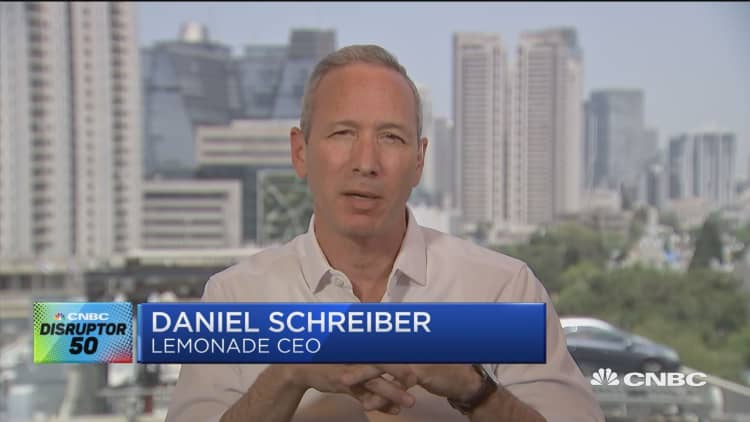You need insurance for all types of things, from your health and life to your home and car.
Yet wading through all your options could wind up leaving you thoroughly confused.
According to the National Association of Insurance Commissioners (NAIC) there were 5,964 insurers in the U.S. in 2018, with consumers paying $2.425 trillion in total premiums.
Among those insurers are new entrants, so-called disruptors — tech start-ups that have landed on the scene, promising an easier and faster process. The new firms include Root, which uses smartphone technology in its car insurance business, and life-insurance company Ethos, which uses predictive analytics and data technology. Both have both recently announced new rounds of funding.
Tech-centric Oscar Health, which started in 2012 and was No. 12 in CNBC's 2018 Disruptor 50, has been slowly expanding offerings compliant with the Affordable Care Act. Meanwhile, Lemonade, which specializes in renters and homeowners insurance, has raised $480 million so far, according to Crunchbase.
"Consumers can buy insurance in a matter of seconds, on their smartphones, chatting to a chatbot," Lemonade's co-founder, Daniel Schreiber, told CNBC in May. The company, No. 37 on CNBC's 2019 Disruptor 50 list, is powered by AI, chatbots and behavior economics.
"About a third of our claims are settled within about three or four seconds by a bot on your app," Schreiber added.
It's no surprise that more companies are going high-tech. Buying insurance online is the most popular method used by 18- to 25-year-olds, according to a September survey by Insurance.com.
Of the 500 people surveyed, 45% bought car insurance on a computer or mobile device, 59% went online to purchase health insurance, 54% got their renters insurance online and 46% bought life insurance on a computer or mobile device.
I talk to people all the time who assumed they were covered for something and they found out they weren't, and that's not a good place for a consumer to wind up.Eric CioppaMaine insurance commissioner
Traditional legacy insurers are also getting into the game, boosting their online presence and taking advantage of some behind-the-scenes disruptors that use sophisticated platforms for underwriting or for automation of applications and renewals, like Indio.
Millennial Tyler Huck, a financial advisor for Atlanta-based Oxygen Financial, said members of his generation are used to doing things via text and email.
However, if people think they are avoiding paying a commission by skipping an in-person meeting with an agent, they are wrong, he said
"A common misconception is [that] if you cut out the human element, you don't have to pay a commission," said Huck, who also hosts a finance and careers podcast for millennials called "They Don't Teach You This."
"That is not true."
Your comfort zone
If you are someone who needs to sit down and walk through your options in-person with an expert, than a traditional insurance agent is probably best for you.
"There are a lot of questions you have to go through throughout the planning process that can determine how much you need and what type of policy you need," Huck said.
In that case, he suggests going to an insurance broker, rather than a specific company. This way, the broker can choose between a number of companies to find the best one for you.
If you are comfortable communicating strictly online, then one of the hi-tech options could be for you.
Due diligence
Before buying any insurance, whether from a traditional or high-tech firm, you should do your research.
First, make sure the company is licensed through your state's department of insurance, said Maine Insurance Superintendent Eric Cioppa, president of the NAIC.
To get a license, there is a "pretty thorough vetting process," and the company has to show it has sufficient capital, he explained.
You can also see if there have been a lot of complaints about a given company through your state's insurance department.

Once you decide on a policy, ask to see it first. You should make sure there is a way to get answers to any questions you may have before signing on the dotted line.
"It doesn't mean you can't get that same quality products through the internet, but you just need to know to ask questions," Cioppa said.
"I talk to people all the time who assumed they were covered for something and they found out they weren't, and that's not a good place for a consumer to wind up."
Shop around
In addition to researching the companies, check around for the best prices.
For example, you can save hundreds of dollars if you shop around for your auto insurance, said Les Masterson, managing editor of Insurance.com, Insure.com and Carinsurance.com.
"Make sure to get quotes for the same level of policies so you can compare them," he said. "With so much being done online, you can track down multiple quotes from auto and home insurance companies easily."
More from Invest in You:
Not having long term care insurance can devastate your financial plan
When it pays to buy travel insurance and when you should pass
Deepak Chopra: Your bad money habits could be harming your health
He also advises asking for discounts — including good driver and good student — and bundling policies such as home and auto together.
Just remember, the lowest price doesn't necessarily mean you'll always get the best policy for you.
CHECK OUT: Suze Orman: 'Do not let these markets scare you — you want these markets to go down' via Grow with Acorns+CNBC.
Disclosure: NBCUniversal and Comcast Ventures are investors in Acorns.






